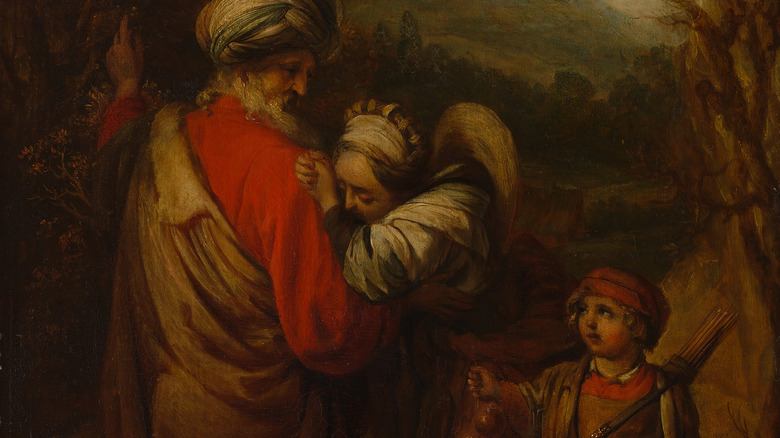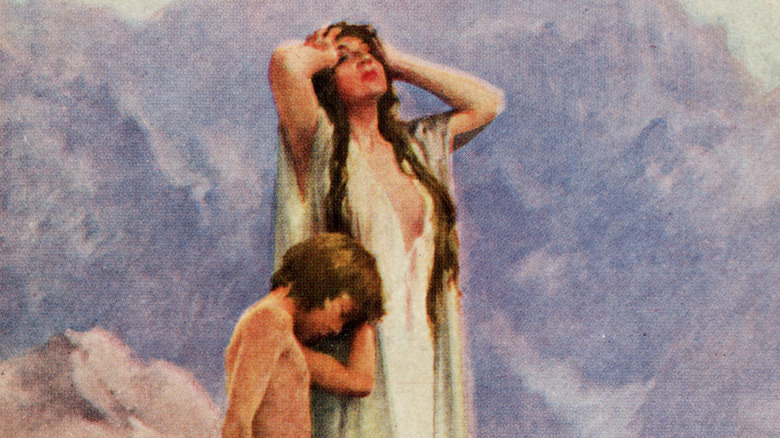Who Is Ishmael In The Bible?
"Call me Ishmael" has become one of the most famous opening lines in literature. The name Ishmael is arguably better known through that appearance in "Moby Dick" than for its biblical origin. The Ishmael of the Bible, a son of Abraham, tends to be overshadowed by his father, his brother Isaac, and his nephew Jacob. Ishmael isn't in that direct line of patriarchs that tradition holds birthed the nation Israel. But Ishmael was the firstborn son of Abraham, and he plays a prominent role in the Book of Genesis and in the Islamic faith.
In Genesis (via Bible Gateway), in the days when Abraham was still known as Abram, his wife Sarai could bear him no children, despite promises from God that Abram would be the father of nations. To try and ensure children, Sarai gave Abram her Egyptian slave Hagar as a second wife. Hagar was quick to conceive. But her pregnancy brought enmity between Hagar and Sarai. By the command of an angel, Hagar remained in Sarai's service despite mistreatment, and it was by the same angel's word that she named her son Ishmael.
The angel foretold that Ishmael would be "a wild donkey of a man." According to Christianty.com, this wasn't seen as an insult in the context of the time Genesis was written. Donkeys had an association with nobility, independence, and resistance to domination. But Hagar was also warned that Ishmael would never live in harmony with his future brothers.
Ishmael was driven out by his mother's rival
According to the Biblical story, Ishmael was 13, and Abram was 100, when Sarai finally conceived and bore Abram his legitimate son, Isaac. By then, Abram had been renamed Abraham ("father of nations," though the translation from Hebrew isn't entirely airtight) by God himself, and Sarai renamed Sarah (a more confusing change, according to the Armstrong Institute of Biblical Archeology). Before Isaac's birth, God confirmed with Abraham that Ishmael would not be the line of Abraham's descendants through whom God would make his covenant. But God also said of Ishmael, "I will surely bless him ... he will be the father of twelve rulers, and I will make him into a great nation."
While Hagar's angel had foretold strife between Ishmael and his brothers, Isaac never really knew his older sibling. During a feast held to celebrate Isaac's weaning, Ishmael's mocking attitude upset Sarah. She demanded that Abraham, who loved his eldest son, cast him and Hagar away. This Abraham was loathe to do until reassured by God of the promise to make Ishmael a great patriarch. The next day, he gave Hagar her freedom, supplied her and Ishmael with provisions, and sent them on their way.
Hagar led her son into the desert of Beersheba and soon resigned herself to death. Unwilling to watch Ishmael die, she left him under a bush and wandered off. Both began to cry until the angel of God returned to Hagar and told her they would not die.
Is Ishmael the ancestor of Muhammad?
The Bible says that, after being saved in the wilderness by the angel of God, Ismael became a great archer in the desert of Beersheba and lived to be 137 years old. Just as Abraham's Jacob begat 12 sons, fathers of the 12 tribes of Israel, Ishmael fathered 12 tribal chieftains. Before his death, Ishmael appears to have been reconciled to Abraham and Isaac, helping his brother to bury their father.
The Quran takes the story and indications of reconciliation further, naming Ishmael as the son who helped Abraham lay the foundations of the Kaaba in Mecca. Tradition in Judaism and Islam holds that Ishmael was the forefather of Arabic tribes — if not all the Arab people — and Islamic literature expanded upon his scriptural history (per Britannica).
Another tradition within Islam holds that Ishmael, often referred to as a prophet himself, is the direct ancestor of Muhammad. Genealogies have traced a line from Ishmael to his son Kedar to the patriarch 'Adnan, from whom Muhammad was descended. But that family tree, and the tradition of Ishmael as the ancestor of Arabs, have both been contested. Linguist and pastor Mark Durie pointed in Middle East Forum to a lack of biblical or linguistic evidence, opining instead that the Ishmaelites were a Semitic tribe absorbed into a larger group. And Rafat Amari of the Religion Research Institute posits insurmountable genealogical gaps to putting Muhammad into the line of Ishmael.


